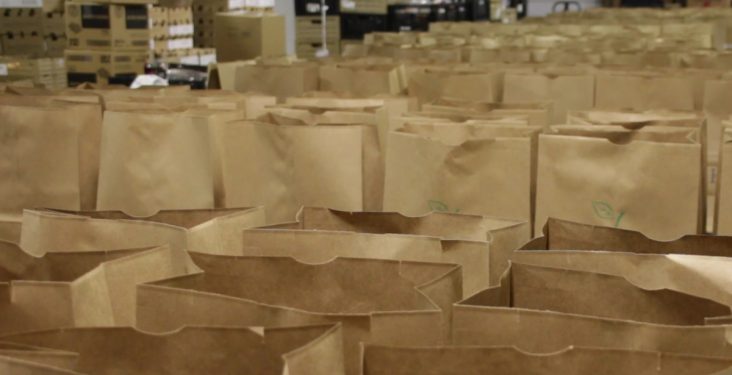Antioch sees 143% increase in food demand in 2020
by March 10, 2021 6:23 pm 633 views

Fort Smith area sales tax revenue during 2020 points to a resilient consumer during the COVID-19 pandemic-induced economic downturn, but food distribution numbers from Antioch for Youth and Family shows significantly higher food insecurity in the region.
The January sales tax report shows that Fort Smith’s share of the 1% Sebastian County sales tax was up more than 11% more than January 2020. In 2020, Fort Smith’s share of the 1% Sebastian County sales tax was $18.246 million, up 5.7% over 2019, and up 5.52% over the city’s budget estimate. The tax has posted year-over-year gains for the past five years, but 2020’s jump was the largest seen during that time period.
Sebastian County sales tax revenue totaled $34.634 million in 2020, up 7%, according to the Arkansas Department of Finance and Administration. Crawford County sales tax revenue was $15.239 million in 2020, up 13.5%.
But a surprisingly resilient consumer economy – propped up many economists say by COVID-19 federal relief efforts that include direct payments to U.S. households and expanded jobless benefits – has not included all consumers in the regional economy, according to Charolette Tidwell, Antioch founder and executive director.
“The demand became so great through a loss of employment, diminished work hours leading to a loss of family income, school closings and even church pantries that had to close,” she said in a note to Talk Business & Politics. “Keep in mind that at the height of the Great Recession, Feeding America estimated the national count of food insecure at 47 million. Today, they estimate 50 million are food insecure. What we are seeing here, is happening everywhere.”
Antioch works to meet food insecurity problems in western Arkansas, including partnerships with senior and Veterans mobile food pantries that deliver food to low income elderly, disabled and struggling families.
In 2019, Antioch distributed 1.512 million pounds of food, including 831,582 pounds from the River Valley Regional Food Bank and 650,001 pounds “self procured” by Antioch. The food value was $2.525 million with an economic impact – using a U.S. Department of Agriculture (USDA) multiplier of 1.8 – of $4.545 million.
But the demand changed in 2020. Antioch distributed 3.679 million pounds in 2020, a 143.3% increase compared with 2019.
“Here at the pantry, about one-third of those coming for assistance are doing so for the first time. I can also say that our Asian neighbors, who rarely asked for help before, are seeking help now. I see an uptick in those coming to the park for help, but the majority remain as over 55-year-old Caucasians,” Tidwell said.
Of the food distributed in 2020, 1.974 million pounds were from the food bank, and 1.673 million pounds were obtained by Antioch through self sourcing, food drives and donations, and the USDA Coronavirus Food Assistance Program that supported Feeding America programs around the country. The value of the food distributed was $6.144 million, and the economic impact totaled $11.06 million.
Tidwell praised large poultry companies for help in acquiring more food, and said Antioch is working to improve how it meets the growing demand.
“With all the shutdowns, in-kind donations were very hard to secure as every food assistance pantry went into overdrive asking for help. Thankfully, OK Foods and Tyson (Foods) have been our amazing pandemic partners,” Tidwell said. “Antioch plans to be more strategic in meeting the need throughout Fort Smith. We will always remain focused on nutrition. Quality always is more important. After all, nutrition is prescription.”
